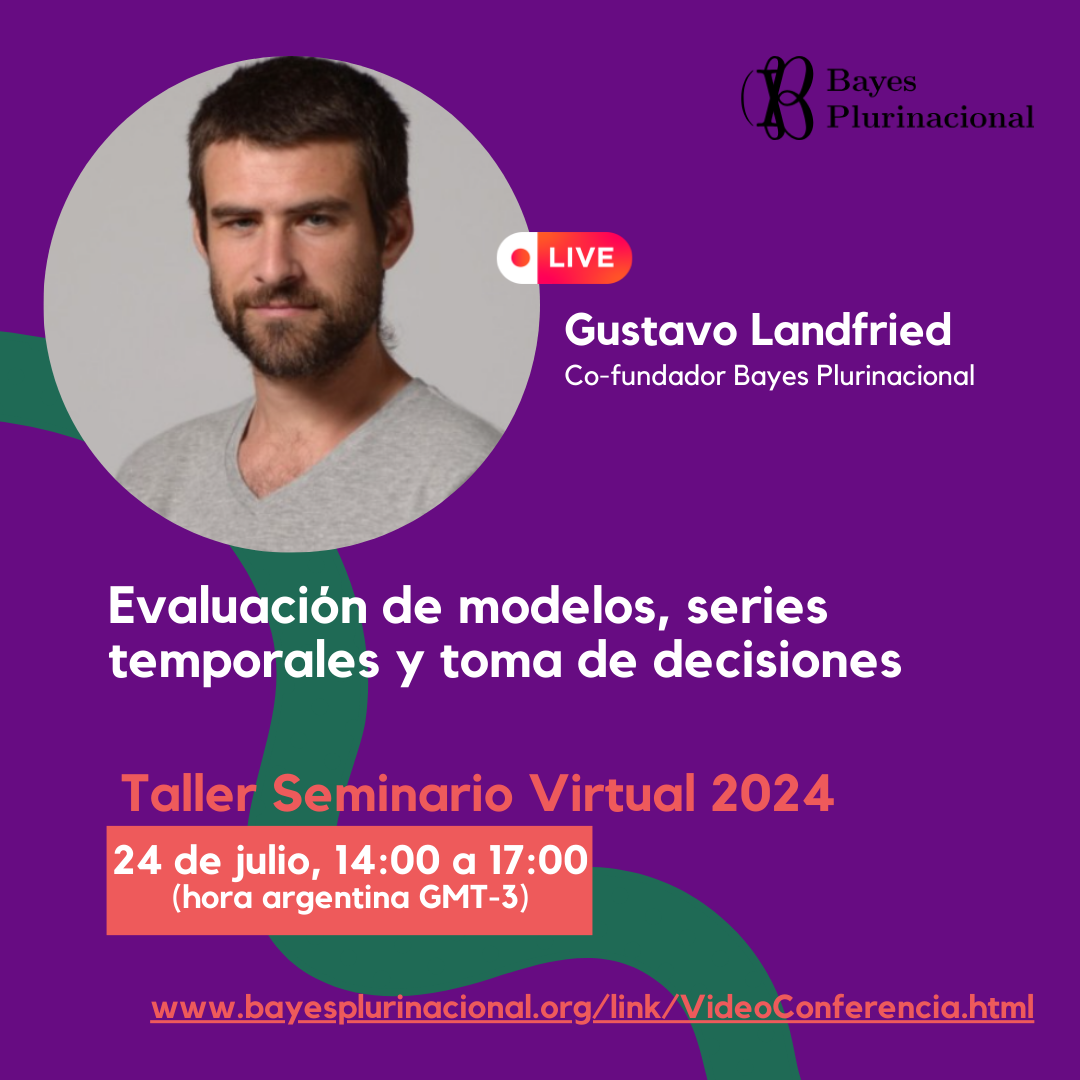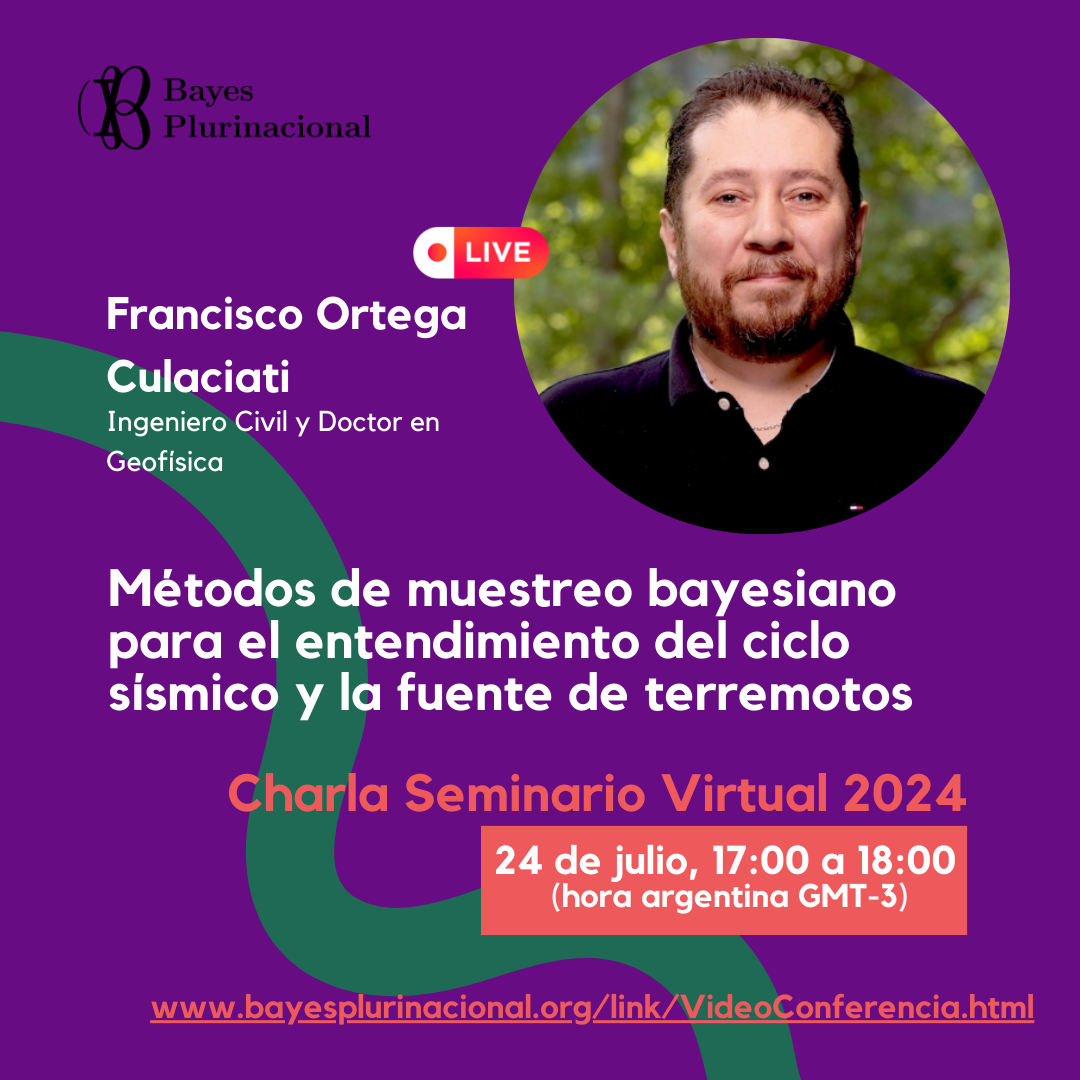🧑🏫 Virtual seminars
Seminar "Optimal beliefs"
This webinar is an opportunity to discuss a wide range of topics. We focus on the Bayesian aspects of practical, theoretical, and philosophical applications in all branches of science and in all productive and social activities. If you want to participate, send your proposal through the form.
Virtual Seminar Series
On July 24 and 25 we will have from 14h to 18h Argentina time (GMT-3): two virtual workshops and two talks.

Schedule. Time ART (GMT-3).
Wednesday, July 24
- 14h-17h Workshop (in Spanish). Evaluation of models, time series and decision making. Gustavo Landfried. Argentina.
- 17h-18h Talk (in Spanish). "Bayesian sampling methods for understanding the seismic cycle and earthquake source". Francisco Ortega Culaciati. Chile.


Thursday, July 25
- 14h-15h Talk (in Spanish). "Application of Bayesian statistics in Paleontology". Jesús Alberto Diaz-Cruz. Mexico.
- 15h-18h Workshop (in English). "Generative modeling". Michael Betancourt. United States.


Seminars 2023
Seminar 4:
Bayesian Learning with Wasserstein Barycenters.
- Gonzalo Ríos. Chief Scientific Officer - NoiseGrasp Spa.
- When: September 4, 2023
- Summary: A model selection paradigm based on the optimal transport criterion is presented: the barycenter under the Wasserstein distance. The selected model will be characterized and some tools for its calculation will be provided.
- Bio: Head of the Data Science area for the development of predictive marketing models at NoiseGrasp Spa. Trained at the University of Chile as a Doctor in Engineering Sciences, Master in Computer Science, Bachelor in Mathematical Sciences, Civil Mathematical Engineer. For a decade he was a professor at the University of Chile in the departments of mathematics, computer science, and engineering.
Seminar 3:
Estimation of cosmological parameters through Bayesian Statistics.
- Francisco Xavier Linares Cedeno. Postdoctoral researcher at the Institute of Physics and Mathematics - Universidad Michoacana de San Nicolás de Hidalgo, Mexico.
- When: June 1, 2023 at 16h (Argentine time GMT-3)
- Material: Divulgation text Cosmology and Bayesian Inference.
- Summary: This talk describes the process of inferring cosmological parameters using Bayes' Theorem. First, the Einstein equations are introduced to build the standard cosmological model LambdaCDM. To analyze the data from Supernovas observations, the calculation of the distance to luminous objects known as the theoretical distance modulus is defined. Second, the information obtained from the supernovas and the procedure to parameterize the observable distance modulus through intrinsic properties of the same are presented. Third, through Bayes' Theorem, the statistical comparison between the prediction of the LambdaCDM model and the distance modulus of the supernovas is established. Specifically, restrictions will be imposed on the total matter parameter of the universe, and the question is posed: what is the most probable value of the amount of matter in the universe, given the supernova data?. Finally, the use of Bayesian statistics in other cosmological contexts will be mentioned.
- Bio: Bachelor of Physics from Simón Bolívar University (USB), Venezuela. Doctor of Physics from the University of Guanajuato, Mexico. He has carried out research stays at several Mexican universities (ICF-UNAM, IFM-UMSNH and DI-UG). He is currently a postdoctoral researcher at the Institute of Physics and Mathematics of the Universidad Michoacana de San Nicolás de Hidalgo (IFM-UMSNH), and a member of the Legacy Survey of Space and Time (LSST-Mexico) collaboration of the Vera Rubin Observatory. Francisco analyzes the dynamics of the cosmos through the Bayesian approach to probability.
Seminar 2:
Impact of the Abdala vaccine against SARS-CoV-2 on the incidence, severity, and mortality of COVID-19 in Havana, Cuba.
- Kenia Almenares. National School of Public Health of Cuba
- When: Thursday, May 11, 2023 at 16h (Argentine time GMT-3)
- Co-authors: Pedro Más Bermejo DrCs., Lizet Sánchez Valdés DrC., María J. Vidal Ledo DrC.
- Material: Article Impact and effectiveness of the Abdala vaccine in the Matanzas province against symptomatic disease and death from COVID-19
- Summary: The Cuban vaccine Abdala was designed by the Center for Genetic Engineering and Biotechnology of Cuba, to control the COVID-19 epidemic. It was implemented in a vaccination campaign in people ≥ 19 years old, in Havana, during May-July 2021. Objective: To evaluate the impact of vaccination on the incidence, severity, and mortality of COVID-19, in Havana, Cuba, from July to October 2021. Method: A longitudinal causal impact study was carried out in Havana, Cuba. The entire population of Havana, 2,137,936 inhabitants, was included, and the Bayesian Structural Time Series model (BSTS) was applied to obtain the impact of vaccination with the Abdala vaccine in the short term, with the calculation of the difference (counterfactual), between the observed time series of incidence, severity, and mortality, and what would have happened if the vaccination had not been intervened. The time series of incidence, severity, and mortality of the provinces of Camagüey and Holguín in the same period of time were used as control series, 95.0% probabilistic intervals were used. Results: In the absence of the intervention, an average value of weekly incidence of 151 cases was expected, instead, 22 were observed, with a relative reduction of 54.0%, the 95.0% counterfactual interval was (-70; -38). Severity did not show significant changes in the short term. However, mortality showed an expected value of around 3 weekly deaths on average, the observed value was 2, with a reduction from the moment of the intervention of 36.0%, interval (-56; -14). Conclusions: The impact of vaccination showed a reduction in the indicators of incidence, severity, and death from COVID-19 in Havana, Cuba.
Seminar 1:
Modeling the dynamics of the primary visual cortex using neural networks trained for probabilistic inference by sampling.
- Rodrigo Echeveste. Researcher at CONICET, sinc(i) Institute, Santa Fe, Argentina.
- When: Thursday, May 4, 2023 at 16h (Argentine time GMT-3)
- Material: Article Cortical-like dynamics in recurrent circuits optimized for sampling-based probabilistic inference
- Summary: In recent years, the use of Deep Learning to explain the behavior of natural neural systems has begun to gain strength. However, these models lack dynamics and do not usually correctly represent the uncertainty of their predictions. Our cerebral cortex, on the other hand, presents a rich dynamics and allows us to navigate in a world in which the information we receive from our senses is always partial and incomplete. In this talk, I will tell you about how to train recurrent neural networks under biological constraints, to approximate an ideal Bayesian observer. Surprisingly, from this purely computational objective, typical dynamic characteristics of the visual cortex emerge, such as gamma oscillations and transient responses with overshoot. These types of models allow us to advance in the understanding of the links between physiology and sensory perception.
- Bio: Physicist from the Balseiro Institute, doctor in Natural Sciences (Goethe University, Germany), collaborator of the Computational and Biological Learning (CBL) group of the University of Cambridge (United Kingdom), CONICET researcher in one of the best artificial intelligence institutes in Latin America, the sinc(i) Santa Fe, Argentina (https://sinc.unl.edu.ar/ ). He is a professor at the public university UNL and coordinator of the Federalization Commission of the Argentine Society of Research in Neurosciences.